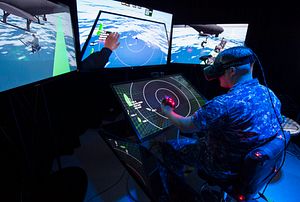The most useful analysis on the future of warfare highlights how cultural, institutional, and professional biases can cloud objective thinking on forthcoming military conflict. For example, analysts often fall into the same trap: imagining the conflicts they would like to fight rather than the conflicts that are most likely to transpire.
Nevertheless, analysts cannot shy away from thinking about the future; after all, it really is their core business. In a recent paper that was meant to be a discussion starter inside the European Union’s institutions, I made a long list of assumptions about the future of warfare. Building on this issue, below is an overview of what analysts view as the main uncertainties pertaining to warfare for the next decade. These are issues experts normally cannot agree on, yet are decisive for the future trajectory of big global trends.
Is China going to surpass the West in military capability?
China has the capabilities and the will to catch up. However, to surpass “the West” China would need to undertake its full transformation into an interventionist power. In addition, no one is sure to what extent China’s current strengths — centralized control over priorities, investment, and the private sector; a long-term plan; and a focus on big ticket technical solutions such as artificial intelligence (AI) and space technology — are useful in innovating its military in the future.
Will China (and Russia) build up a military alliance that could project power globally?
The Trump administration’s policies are harming the alliances and friendships the United States has carefully developed and seen as one of its greatest assets over the last 70 years. Does this provide space for China to come in and create a global “Silk Road alliance” with new and old authoritarian regimes — above all Russia — and opportunist democracies? How would Western militaries do in a worldwide conventional war against such a group of peers? The West has not been good in estimating its capability versus that of its competitors.
What is the danger and the potential of the cyber dimension in warfare?
The future of cyber will depend on the future of vulnerabilities, especially the development of the internet of things, and on possible international control and verification. The digital revolution has produced a new domain in which to spy, sabotage, and prepare the battlefield, but some experts think the worst gaps in our defenses have been filled. A new generation of military and civilian leaders seems increasingly aware of the realities of this game. AI might provide more balance between offense and defense, and international norms start to shape behavior. Nevertheless, the future holds more players, more hackable systems and more valuable and critical cyber territory to fight over.
What will be the future of research and application of robotics, autonomous systems and artificial intelligence?
Much depends on how fast these technologies will develop, how quickly and economically they will be incorporated into weapons systems and the effect of international regulation. Their impact will also depend on their capability in the wide range of future crises, and in subduing civilian populations. Arms races and early adoption could lead to loss of control. Beyond that, the major question is how AI will develop — as an evolutionary or revolutionary capability — and how we master our interaction with AI advice and decisions. Preferring AI and autonomous systems in a supportive role rather than as final arbiter of life and death might come with a heavy price tag, but it is one we might be willing to pay to maintain our belief in the value of a human finger on the trigger.
Will there be a paradigmatic technological breakthrough in either quantum computing, general artificial intelligence, or defensive strategic weapons?
All three breakthroughs are low-probability, high-impact events. A general AI would revolutionize the whole world, and with it warfare. Quantum computing has been a catchphrase for some time, but its revolutionary potential has not been sufficiently researched. Current fantasies of technologies rendering even hypersonic or ballistic missiles useless would of course change the nature of deterrence and could open a new age of limited warfare.
How far will nuclear deterrence limit and shape big power conflict?
Most experts still think that the risk of a nuclear exchange in a major war between nuclear powers is too damaging for anyone to try their luck. Others point out that limited wars could be fought under the assumption that the use of nuclear weapons would be seen as breaking a taboo and would pose even graver consequences for the user. One growing uncertainty is in misinterpreting your opponent(s). Due to the multipolar nature of the future international system, nuclear powers will have to deal with more ambiguity, aggressive behavior, and shifting alliances. This puts additional strain on political, diplomatic, and military systems that presently might not be built for such a world.
What will happen to the idea of using nuclear weapons as deterrents or bargaining chips?
The fates of countries that have developed or kept their nuclear weapons versus those that have not might affect the thinking of other states contemplating the adoption of nuclear capability. One just has to compare the current state of Libya, Ukraine, and Iran to that of North Korea, Israel, and Pakistan. Important here will be the future trajectories of the North Korea conflict (which could signal options to other countries), the Non-Proliferation Treaty (NPT) and NPT non-signatories (such as India, Pakistan, and Israel), and potential nuclear weapon states (such as Japan, Saudi Arabia, and Iran).
Leopold Schmertzing is a policy analyst in the European Parliamentary Research Service (EPRS). This article draws from his recently published “ESPAS Ideas Paper: The Future of Warfare.” This article has previously been published by the EastWest Institute.

































